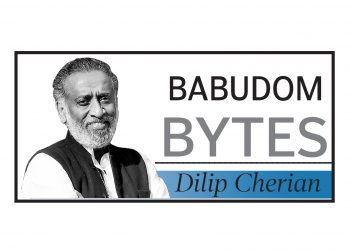In the never-ending tussle between Narendra Modi sarkar and Delhi Chief Minister Arvind Kejriwal, Delhi Chief Secretary Naresh Kumar finds himself embroiled in a fresh controversy. While his previous headline-grabbing act involved sending files directly to Lt Governor V.K. Saxena on service matters, bypassing the CM’s office, this time the storm is over a dispute over the valuation of land earmarked for the Dwarka Expressway, and his alleged role.
The plot under scrutiny was set to be acquired from two Delhi businessmen, one of whom shares a marital connection with the promoter of a real estate firm that employs Kumar’s son. Despite concerns regarding a potential conflict of interest, Kumar denies any wrongdoing.
According to sources, the dispute centres around the substantial increase in compensation awarded by the district magistrate of southwest Delhi, Hemant Kumar, which shot up from Rs 41.52 crore to Rs 353 crore for the same parcel of land.
Despite the Chief Secretary’s attempts to distance himself from the controversy, doubts persist about this failure to declare the potential conflict of interest when the National Highway of India (NHAI) raised concerns.
For Kejriwal, who is back against the wall, after the arrest of Deputy CM Manish Sisodia and other senior leaders of the Aam Aadmi Party (AAP) for what he calls a witch hunt unleashed by the Modi sarkar, this episode may be a chance to hit back. Kejriwal has referred the matter to the Vigilance Department, and Minister Atishi Marlena has initiated an inquiry. Kumar, meanwhile, denies the allegations and attributes them to a political agenda aimed at tarnishing his reputation. Meanwhile, some in the bureaucracy are also questioning Kejriwal for signing off on the transfer of District Magistrate Hemant Kumar. Kumar was among the 21 IAS officers to be recommended for posting, in his case, to the Administrative Reforms Department.
Which way this will go is anybody’s guess. But in this entire tussle, Delhi’s bureaucracy has split down the middle, which is not a good sign for administrators. Public trust is at stake.
Election dynamics? Unpacking strategic babu changes
In a significant move, the Appointments Committee of Cabinet (ACC) recently gave the nod to a major reshuffle of IAS and IRS officers, elevating several to the rank of Additional Secretary. As the dust settles on these appointments, observers cannot help but ponder the motivations behind the move, particularly in the middle of five critical state elections.
The list of newly appointed additional secretaries includes seasoned babus from various cadres, each entrusted with crucial responsibilities across diverse ministries. Notable among them are Anurag Agarwal, now Additional Secretary & Financial Advisor at the Ministry of External Affairs (MEA) and Rupinder Brar, assuming the role of Additional Secretary at the Ministry of Coal.
The reshuffling extends to key domains such as health, petroleum, textiles and rural development, with officers like Deepti Gaur Mukerjee, Pallavi Jain Govil, and Carolyn Khongwar Deshmukh taking up key roles. Furthermore, the appointment of Amit Kumar Gosh as Additional Secretary in the Department of Social Justice & Empowerment underscores Modi Sarkar’s focus on key issues facing marginalized communities.
The question that arises is: what could be the underlying rationale behind these appointments, especially at a juncture when the stakes are high for the Modi sarkar in the states that are having elections? Is this a routine babu reshuffle or does it carry deeper political implications?
Notably, officers have been upgraded in situ to the rank of additional secretary, signifying recognition of their capabilities and the need for experienced hands in crucial positions. Only time will reveal the full picture behind these recent appointments.
Cadre distribution confusion lands in court
Almost a decade after the bifurcation of Andhra Pradesh and the creation of Telangana in 2014, babus in the state continue to grapple with the cadre distribution at that time. Current proceedings in the Telangana High Court shed light on the enduring confusion surrounding the allocation of cadres, particularly for six IAS/IPS officers.
The Centre, however, reiterated its stance to the high court that the judgement pertaining to former Telangana chief secretary Somesh Kumar’s case should be applied to the pleas filed by these six officers. The government’s primary argument appears to be a straightforward one—there is nothing more to discuss! However, the officers in question, including Director General of Police Anjani Kumar, vehemently oppose this assertion, contending that their cases are distinct from the precedent set by the Somesh Kumar judgment.
The legal tussle is unfolding as the high court navigates through the contentions of 13 officers who express grievances regarding the central government’s decisions and cadre distribution process. While the Centre’s counsel maintains that the cases of six officers align with the Somesh judgement, seven others necessitate further deliberation. The divergent claims of officers caught in the web of cadre confusion will need a nuanced approach to the issue.
Share a babu experience! Follow dilipthecherian@twitter.com. Let’s multiply the effect







































